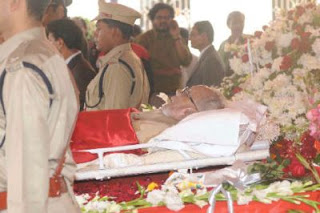


The death of MM Lawrence, a veteran Communist and trade unionist, has sparked a legal battle between his daughter and other family members over his wish to donate his body for medical research. The case has brought to the forefront the complexities that arise when religious and family sentiments clash with personal end-of-life choices. The Kerala Yuktvadi Sangham and AT Kovoor Trust are fighting to protect the rights of individuals over their dead bodies, as they face challenges in enforcing the existing Kerala Anatomy Act.
Body Donation: Clash of Sentiments and Personal Choices
Body donation is the voluntary gift of one's body or organs after death for medical research, education, or transplantation. While it is a selfless act that can advance scientific knowledge and save lives, it has also sparked ethical, religious, and family conflicts.
The recent case of MM Lawrence, a veteran Communist and trade unionist, has highlighted the complexities surrounding body donation. Lawrence's wish to donate his body for medical research was contested by his daughter, who objected on religious grounds.
Kerala Anatomy Act
The Kerala Anatomy Act, 1970, governs body donation in the state. It allows individuals to make a written declaration of their intention to donate their bodies for specified purposes. However, if the declaration is not made or is not valid, the next of kin has the authority to decide on body disposition.
Legal Battle
Lawrence's daughter's challenge sparked a legal battle between her and other family members. The Kerala Yuktvadi Sangham and AT Kovoor Trust, two organizations representing Lawrence's supporters, intervened in the case to protect his right to body donation.
The court ruled in favor of the family members who supported Lawrence's wish. It held that the Anatomy Act gives precedence to the written declaration of the deceased over the objections of the next of kin.
Clash of Sentiments
The case has brought to light the clash between personal end-of-life choices and religious and family sentiments. Some religions view cremation or burial as the only acceptable ways to dispose of the body. Others may object to the idea of their loved ones' bodies being used for research or transplantation.
Top 5 FAQs on Body Donation
Q1: Who can donate their body? A: Legally competent adults can make a written declaration of body donation.
Q2: What are the uses of donated bodies? A: Medical research, education, and surgical training.
Q3: Is body donation legal? A: Yes, it is legal in most countries, including India.
Q4: Can my family override my wish to donate my body? A: In India, the next of kin has the authority to override the deceased's declaration if it is not made in writing or is invalid.
Q5: Is it possible to donate organs and also donate my body? A: Yes, it is possible to donate both organs and the remaining body for medical purposes.
Conclusion
Body donation is a complex issue that involves ethical, religious, and legal considerations. The Kerala Anatomy Act and recent court rulings have emphasized the importance of respecting the wishes of deceased individuals who have made a voluntary declaration to donate their bodies. However, the clash between personal choices and family sentiments remains a sensitive issue that requires ongoing dialogue and understanding.

BJP leader Chandrashekhar Bawankule sparked controversy with his statement that party workers' phones and WhatsApp groups are being monitored ahead of local body elections. Shiv Sena leader Sanjay Raut demanded his arrest, alleging that the phones of several Opposition leaders were also tapped. Bawankule clarified his statement, but the Sena leader questioned the involvement of BJP offices and technology networks, calling it a potentially anti-national act.

The Election Commission (EC) has announced the schedule for Special Summary Revision (SIR) of electoral rolls in 12 states and Union Territories (UTs) for the year 2025, excluding Assam due to the ongoing National Register of Citizens (NRC) process. While the BJP has welcomed the announcement, the Congress has raised concerns and questioned the decision. The Chief Election Commissioner (CEC) has stated that Assam has a separate provision in citizenship laws and the NRC process must be taken into consideration, causing potential delays in the SIR preparations. Despite the physical closure of banks in Ranchi and Patna, financial services will remain available through digital and self-service platforms, so customers are advised to use online banking and plan any in-branch visits accordingly.

In a step towards promoting ethical governance and preventing corruption, Chief Secretary Atal Dulloo administered the Integrity Pledge to officers and officials at the Civil Secretariat in Srinagar. This marked the beginning of the National Vigilance Awareness Week, a nationwide campaign held annually by the Central Vigilance Commission. The theme for this year is "Vigilance: Our Shared Responsibility", emphasizing the role of collective efforts in upholding integrity, transparency, and accountability in public administration. Throughout the week, various activities will be conducted to sensitize employees and citizens on the importance of honesty and integrity in governance.

In a bid to promote integrity and fight against corruption, the Central Vigilance Commission has declared the observation of 'Vigilance Awareness Week' with the theme 'Our Shared Responsibility'. Health Minister JP Nadda, during the launch, stressed the need for institutionalizing ethical practices and building a culture of vigilance in every level of governance. He also urged for creating a checklist of do's and don'ts in simple terms to prevent unintentional wrongdoings.

Delhi Environment Minister Manjinder Singh Sirsa chaired a meeting to discuss ways to control dust pollution from construction activities in the city. He revealed that an extensive campaign has been launched to monitor and penalize illegal and unregistered construction projects. The Minister also directed officials to expedite field actions and simplify the registration process to ensure timely intervention against polluters.

In a press conference held in New Delhi, the Election Commission has announced phase two of special intensive revision of electoral rolls in 12 states. This comes after political parties raised concerns about the quality of the rolls. While Tamil Nadu Chief Minister MK Stalin arrived at DMK headquarters to discuss the issue, Assam's electoral roll revision will be announced separately due to the ongoing process of the National Register of Citizens. The EC has assured that there will be no obstacles in implementing the roll clean-up exercise in West Bengal.

President Droupadi Murmu addressed probationers of the Indian Police Service 77 RR (2024 batch) and emphasized the significant role that effective policing and future-ready technology play in promoting growth and attracting investment in any state. She highlighted the transformational impact of technology in the realm of policing and urged young officers to remain ahead in adopting new technologies, including AI, to combat threats to citizens. The President also encouraged ethical decision-making and accountability among young officers occupying positions of power and authority.

CEC Gyanesh Kumar has announced the second phase of the Special Intensive Revision (SIR) of electoral rolls in 12 states and Union Territories, covering 51 crore voters. He also addressed concerns over the state of West Bengal, clarifying that there is no confrontation between the Election Commission and the state government. Additionally, he reminded that Aadhaar card is not proof of citizenship, but can be used as identity proof in the SIR process.

After Chief Justice Gavai's formal recommendation, Union Government is set to appoint Justice Surya Kant as the next Chief Justice of India. With a distinguished legal career and key institutional roles, Justice Kant is highly regarded for his commitment to electoral transparency and landmark verdicts on various issues including abrogation of Article 370 and free speech. His term is expected to begin on November 24, 2025, and last for approximately 15 months.

On Monday, Union Home Minister Amit Shah inaugurated the fourth edition of the India Maritime Week 2025, where renowned leaders, policymakers, and maritime experts from India and abroad are expected to participate over the next 5 days. In his keynote speech, Shah highlighted India's growing maritime strength and strategic location, citing the government's efforts to increase port handling capacity and develop new mega and deep-draft ports. He also inaugurated state-of-the-art Deep-Sea Fishing Vessels under the Pradhan Mantri Matsya Sampada Yojna at Mumbai's Mazagaon Dock. The event, organised by the Ministry of Ports, Shipping and Waterways, is being held in partnership with the Indian Ports Association and will conclude on October 31.